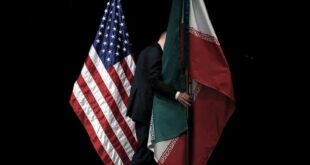 TEHRAN (FNA)- The Export Development Bank of Iran (EDBI) denied on Thursday US Treasury charges, and said financial sanctions imposed by Washington are illegal, noting it will file a complaint against the move.
TEHRAN (FNA)- The Export Development Bank of Iran (EDBI) denied on Thursday US Treasury charges, and said financial sanctions imposed by Washington are illegal, noting it will file a complaint against the move.
The US Treasury Department on Wednesday named the bank a proliferator, a term used by Washington to describe Iran’s peaceful nuclear energy program.
Once branded as such, all transactions between an organization and Americans are banned and any assets that the company has within US jurisdiction can be seized.
The United States and its Western allies accuse Iran of trying to develop nuclear weapons under the cover of a civilian nuclear program, while they have never presented any corroborative document to substantiate their allegations. Iran denies the charges and insists that its nuclear program is for peaceful purposes only.
Tehran stresses that the country has always pursued a civilian path to provide power to the growing number of Iranian population, whose fossil fuel would eventually run dry.
The United States has targeted several big Iranian state banks with sanctions, namely Bank Mellat, Bank Melli, Bank Sedarat and Bank Sepah, in a bid to pressure Iran to give up its nuclear rights envisaged in the Non-Proliferation Treaty (NPT) for all signatories.
Iranian officials have brushed off the impact of such steps.
“The bank will file a complaint with relevant authorities in order to preserve its rights against the US Treasury for its interventionist measure,” EDBI said in a statement.
“The EDBI strongly rejects the groundless claims by the US Treasury and regards this measure as a propaganda move in order to cover up the consequences of the recent American economic crisis,” it said, adding the charge had “no legal basis” and that the bank always worked within the law.
The US Treasury also designated three other enterprises as proliferators that it said were linked to EDBI. They are the EDBI Stock Brokerage Company and the EDBI Exchange Company, both in Iran, and Banco Internacional de Desarollo C.A. of Venezuela.
Iran is under four rounds of UN Security Council sanctions for turning down West’s calls to give up its right of uranium enrichment, saying the demand is politically tainted and illogical.
Iran has so far ruled out halting or limiting its nuclear work in exchange for trade and other incentives, saying that renouncing its rights under the NPT would encourage world powers to put further pressure on the country and would not lead to a change in the West’s hardline stance on Tehran.
Iran has also insisted that it would continue enriching uranium because it needs to provide fuel to a 300-megawatt light-water reactor it is building in the southwestern town of Darkhoveyn as well as its first nuclear power plant in the southern port city of Bushehr.
Analysts believe that the US is at loggerheads with Iran due mainly to the independent and home-grown nature of Tehran’s nuclear technology, which gives the Islamic Republic the potential to turn into a world power and a role model for other third-world countries. Washington has laid much pressure on Iran to make it give up the most sensitive and advanced part of the technology, which is uranium enrichment, a process used for producing nuclear fuel for power plants.
Washington’s push for additional UN penalties contradicts a recent report by 16 US intelligence bodies that endorsed the civilian nature of Iran’s programs. Following the US National Intelligence Estimate (NIE) and similar reports by the IAEA head – one in November and the other one in February – which praised Iran’s truthfulness about key aspects of its past nuclear activities and announced settlement of outstanding issues with Tehran, any effort to impose further sanctions or launch military action against Iran seems to be completely irrational.
The February report by the UN nuclear watchdog, the International Atomic Energy Agency, praised Iran’s cooperation in clearing up all of the past questions over its nuclear program, vindicating Iran’s nuclear program and leaving no justification for any new UN sanctions.
Also in his latest report to the 35-nation Board of Governors, IAEA Director General Mohamed ElBaradei confirmed “the non-diversion” of nuclear material in Iran and added that the agency had found no “components of a nuclear weapon” or “related nuclear physics studies” in the country.
The IAEA report confirmed that Iran has managed to enrich uranium-235 to a level ‘less than 5 percent.’ Such a rate is consistent with the construction of a nuclear power plant. Nuclear arms production, meanwhile, requires an enrichment level of above 90 percent.
Mohammed ElBaradei, chief of the International Atomic Energy Agency, also said on Monday that Iran remains far from acquiring capabilities to develop nuclear weapons as it is still lacking the key components to produce an atomic weapon.
“They do not have even the nuclear material, the raw unenriched uranium to develop one nuclear weapon if they decide to do so,” said the head of the UN nuclear watchdog agency.
The IAEA has so far carried out at least 14 surprise inspections of Iran’s nuclear sites so far, but found nothing to support West’s allegations.
The Vienna-based UN nuclear watchdog continues snap inspections of Iranian nuclear sites and has reported that all “declared nuclear material in Iran has been accounted for, and therefore such material is not diverted to prohibited activities.”
Many world nations have called the UN Security Council pressure against Iran unjustified, especially in the wake of recent IAEA reports, stressing that Tehran’s case should be normalized and returned to the UN nuclear watchdog due to the Islamic Republic’s increased cooperation with the agency.
Analysts believe that Bush’s attempt to rally international pressure against Iran has lost steam due to the growing international vigilance, specially following the latest IAEA and US intelligence reports.
US President George W. Bush finished a tour of the Middle East in winter to gain the consensus of his Arab allies to unite against Iran.
But hosting officials of the regional nations dismissed Bush’s allegations, describing Tehran as a good friend of their countries.
 Eurasia Press & News
Eurasia Press & News

